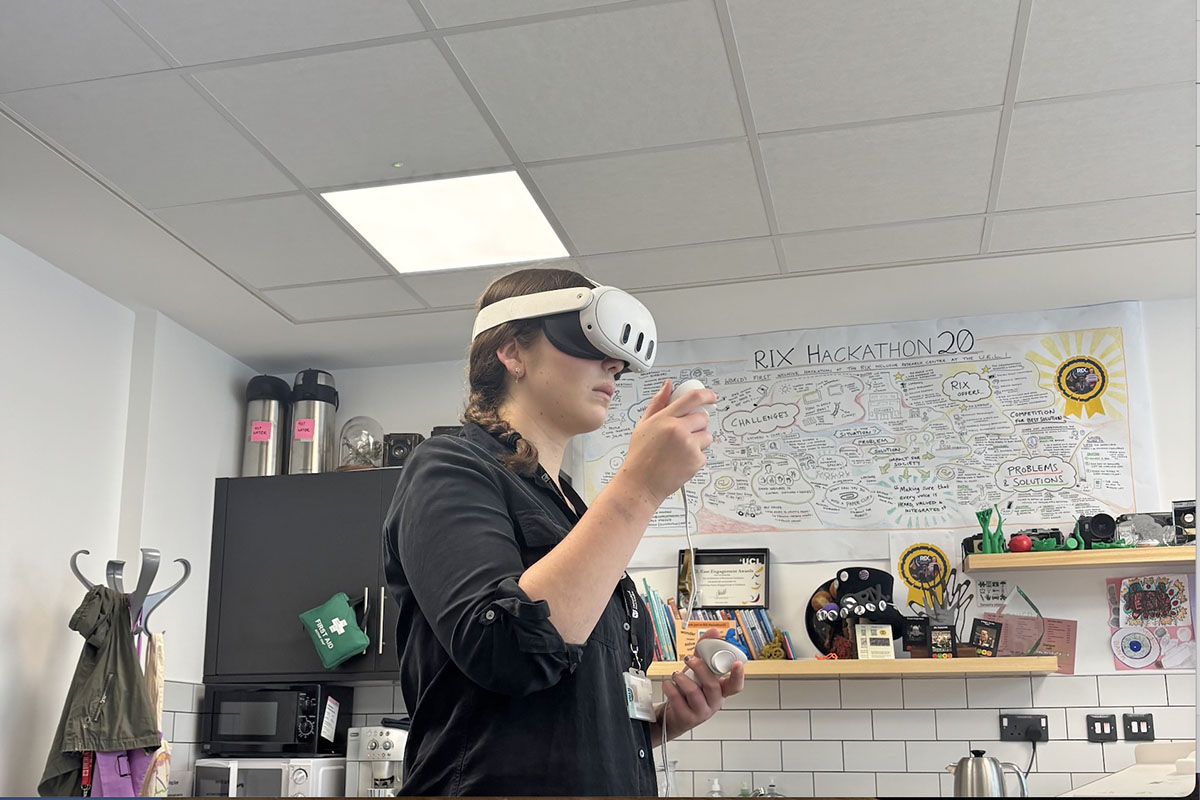Stepping off the DLR train onto the University of East London’s Docklands campus, a wave of nerves intertwined with excitement washed over me. After getting lost for a few minutes, I had finally arrived at RIX where I was warmly welcomed by staff for the start of my six week internship.
Almost immediately, I had the opportunity to observe a purpleSTARS meeting, one of the initiatives based at RIX that focuses on enhancing museum accessibility by transforming exhibits into a multisensory experience. Listening to the seamless collaboration between co-researchers, staff, and other meeting attendees, I learned for the first time what inclusive research truly looks like.
Inclusive research combines the knowledge of experts by experience and educators to create meaningful solutions to social issues. Being in this meeting reminded me of the bidirectional relationship between knowledge and experience that influences how we navigate sociocultural problems. From my first day on, I knew that interning at RIX would provide me with an unparalleled opportunity for my personal and professional growth.
The connection of experience and knowledge that I learned about at the purpleSTARS meeting was reinforced through the project I completed, mapping wheelchair accessible routes on the London public transport network. RIX was hosting a summer school programme based at UEL that took students to famous sites around the city. Given that some students had accessibility requirements, I worked with another intern to navigate an accessible route in advance of their journeys. The ease I had previously associated with the tube, as Londoners call their underground train system, soon dissipated. This experience opened my eyes to the long road ahead for Transport for London (TFL) if it is to make the system fully accessible.
We ended up at two stations that were supposed to have working lifts (elevators to us Americans) but there were none to be found. As a consequence we had to scramble to find another route. The consequences of this kind of misinformation would certainly be detrimental to someone who uses a wheelchair because they would be stuck on the platform, forced to wait ages for support from TFL staff.
Our journey took about an hour longer than it would have done if the tube station next to the museum we were visiting had been accessible. Understanding of these issues only comes from experience or listening to those with the experience, hence why RIX’s mission of inclusive research is so important. This project inspired me to research the history of accessibility and public transport for a class I am taking while here in London.
Interestingly, I noticed an incongruence between legislation, the Equality Act of 2010, and reality. This disconnect is also evident in my home country, the United States. The fight for full accessibility is universal and requires more than just legislation, it requires action and real change. I look forward to seeing how RIX’s development of a robotic ramp progresses as I think it would be a great addition to improve accessibility for wheelchair users.

In addition, I enjoyed spending time improving my qualitative data analytic skills by working with Liselle. She co-wrote and directed an original cabaret style musical, Not Fucking Sorry (NFS), that aims to eliminate stigma of disability and raise awareness of inequities that exist. Listening to audio recordings of rehearsals and watching videos deepened my understanding of theatre as a form of activism both on the stage and through the rehearsal process. The patience and kindness evident across the entire production team stood in stark contrast to the stories I’ve heard about unfair treatment in the media generally, usually hidden behind the scenes. I hope that every creative team can work in the way that I witnessed with NFS.
Lastly, I collaborated with another intern to support the Dialogue Cafe, a coffee shop on UEL’s Docklands campus that employs Deaf/hard of hearing people with the aim of increasing interpersonal communication between the non-hearing and hearing populations.
I also got the chance to explore Virtual Reality in the context of how it may help wheelchair users. The vast array of projects and focus groups I observed while interning with RIX has improved my awareness of accessibility and inclusion. I immensely enjoyed my time working here and I look forward to seeing the impact of the Rix Inclusive Research Institute in the future.
Julie Rose Elbaum, CAPA Intern
